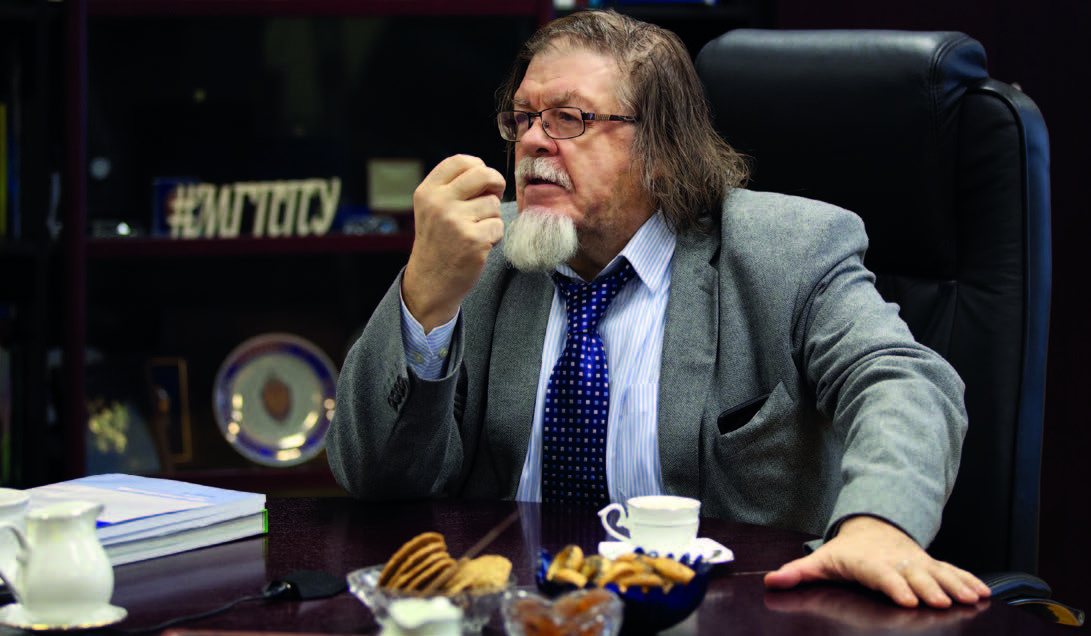Man of Activity
Tо the 75th Anniversary of Vitaly Vladimirovich Rubtsov
On October 20th, Dr. Vitaliy V. Rubtsov celebrates his 75th anniversary. Dr. Rubtsov is a founder, the first dean, the president of MSUPE, and the head of the International UNESCO Chair on “Cultural-historical Psychology of Childhood” (MSUPE). Vitaly Rubtsov is a leading scientist, a specialist in general psychology, pedagogical and age psychology, an academician of RAO Rubtsov began, under the guidance of Dr. Vasiliy Davydov, to study the problem of cooperativeness in solving physical tasks and created a new scientific direction in sociogenetic psychology. He investigated the determination of developmental processes in learning by social relationships between children and adults, he created a concept of new forms of child-adult sociality in education. He investigated the formation of the individual subject within the collective subject, investigated the correlation between the transformation of the collective subject and rising learning independence, initiative, arbitrariness, and freedom among other students. The traditional school tries to make the content and form of learning accessible for children's (and adults') minds, and cultivates "delayed" development; the school is not ready to change. Such a conclusion is made by Vasily Davydova. A school (class, group) that sees itself as a place for the transfer of knowledge, skills and abilities, rather than as a potential collective subject that seeks, tries, and transforms, full of initiative from children and adults. Such a school cannot become a child-adult community. This is a conclusion from the works of Dr. Rubtsov in continuation of Vasily Davydov's ideas. How to create a developing learning community of children and adults as individuals within schools — it's the main problem that solves Rubtsov and his followers.
Starting in the late 1980s, Vitaly Rubtsov initiated and developed many educational projects, from the informatization of education to the creation of educational standards for teacher training.
For the first time, a wide range of psychologists who had previously been assigned to "service" functions (diagnosis, counseling, etc.) were recruited for this work. These were the psychologists from the Psychological Institute of the Russian Academy of Education, which Rubtsov headed for more than 20 years, and the MSUPE "on the shoulders of the scientific schools of the Institute" (Rubtsov's expression). The dispute about which approach is better — the activity or non-activity approach — was resolved in the practical sphere, where Rubtsov's team designed educational programs. Rubtsov developed educational practices in learning, games, and other types of activities. In order to transform social practices, it is necessary to develop these practices as a transforming activity. It is pointless to "transform" anything from the outside. If we wish to achieve the developmental effects of education, then the models of education themselves should be constructed as "development of activity" (V.V. Davydov). Following this logic, Dr. Rubtsov conceived and created our university, MSUPE, and continues to work on it. MSUPE is a peculiar world of activities. Students get introduced to it from the very beginning, and the more they learn, the more they understand how activities are organized. According to the idea of Dr. Rubtsov, there should be no borders between fundamental knowledge (theoretical thinking), "application of knowledge" (theoretical thinking in order to obtain new knowledge), designing (the project is a theoretical way of transforming reality), and organization of activity (it is a cooperation of the actions of participants; "understanding of the essence of the matter" is a component of theoretical design). As far as we know, such a model of university education has no analogues. A few years ago, Vitaly Rubtsov gave an interview for the MSUPE video project "Psychologist-and-Me: Living Stories". When he was asked, what his dream was, he answered: “I dream of building a school. I dream about it, because I know how to do it. I know how to teach children to learn. That's what schools are for”. There was the wisdom of a scientist who, having created a scientific school and the university, came to the most difficult task: to be a school teacher.
He, in the words of Martin Heidegger, "must have the capacity to be more teachable than the students. The teacher is much less certain of his rationale than those who learn. If the relations between the teacher and his subject are healthy, then there is no room for the authority of omniscience or a personal authoritarian position. In such a case, becoming a teacher is a sublime vocation, which is in some ways quite different from becoming a famous professor. But this can be deeply understood only by the "famous professor," i.e., the scholar. As he realizes himself to be a teacher he, at the same time, is able to assume the changing position of the student in teaching. It is difficult to answer the question of who has it harder. We can only give an example of the "coincidence of positions" of scientist, teacher and student, as Vitaly Rubtsov does, following the ideas of his teacher Vasily Davydov. He could work in there positions cheerfully, energetically, and youthfully; it's a gift and a condition for new accomplishments. A gift is always a burden, which you can't share with others, although, in the end, this gift is meant for them. And it is a lucky vocation.
We congratulate Vitaly Rubtsov on his anniversary and wish him many years, good health, strength, and the mood to follow his vocation.
